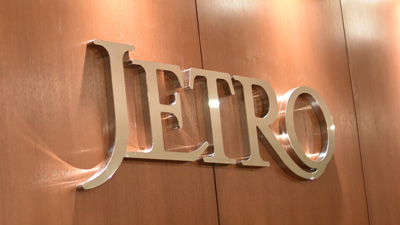New Heights for English Education in Japan through the ELSA App
ELSA is an AI-assisted English conversation app that leverages AI to help users improve their English pronunciation. The app already has 50 million users in 101 countries, with great reviews worldwide for its virtual pronunciation correction service that utilizes voice recognition technology and artificial intelligence.
The developer of the app, Elsa Corp., is an American EdTech company founded in Silicon Valley in 2016. Today we spoke with Shunya Tamaki, Country Manager of ELSA Corp. in Japan, on the background of the app’s development and its entry into Japan.

- Establishment
- 2022/11
- Destination
- Tokyo・Kanto
- ICT
-
USA
Update : 2024/04
ELSA: AI-based English Pronunciation Improvement for All
Just exactly how does the app work? The first thing ELSA does is analyze the words spoken by learners in real time. Then, it compares their speech to the pronunciation of a native speaker and determines how close the input is to correct pronunciation. This gives learners a representation of their spoken English level in terms of pronunciation, stress, intonation, fluency, vocabulary and grammar, and lets them improve their English pronunciation without taking 1 on 1 lessons in person. Through self-directed practice using ELSA's unique deep learning-based voice recognition technology, users can improve their English at their own pace.

Shunya Tamaki, Country Manager, ELSA Corp.
Tamaki explains further, "We are developing our own voice recognition AI. Using this cutting-edge technology, we measure the pronunciation of non-native speakers and score them on the naturalness of their pronunciation. ELSA allows users to take English conversation lessons as if they were sitting next to a native English-speaking teacher. Thanks to the immediate feedback provided by AI, users can improve their English pronunciation, and also greatly improve their listening comprehension."
In November 2022, Elsa Corp. established ELSA Corp. in Japan, in Tokyo. Today, sales of the app are growing at a significantly higher rate in Japan than in other countries. Although ELSA is available in many markets worldwide, their market expansion in Japan has the express focus of turning the country into ELSA’s number-one market by 2025.

ELSA’s AI-Powered Speech Analyzer
Educational Expansion, from Elementary to University, as well as Local Governments and Companies
In 2020, Japan's Ministry of Education, Culture, Sports, Science and Technology revised the National Curriculum Standards for the first time in around 10 years. Foreign language-related activities were introduced in the third and fourth grades of elementary school, and foreign languages were assigned as subjects in the fifth and sixth grades. These revisions were put in place in response to societal changes and a continued rise in globalization and the proliferation of information technology. The government aimed to comprehensively nurture Japanese students’ ability to listen, read, speak and write in a foreign language, to foster requisite communication skills by the time they graduate from high school.
Amid growing momentum for foreign language education and the notable focus on EdTech, ensuring that each student receives the amount of English language instruction they need is urgently required, and a more scalable solution is needed in the education field.
As the demand for more effective foreign language education is growing throughout the Japanese education world, ELSA’s technology that provides AI-mediated coaching based on students' English proficiency levels was a godsend.
Students who have used ELSA have been impressed with the system, with feedback including, "I can check my pronunciation and confirm what I’m doing right, and what needs improvement," and "My pronunciation is constantly improving. Speaking in English is fun now."
ELSA has also been very positively appraised by many educational professionals from elementary through university, and a partnership agreement has been concluded with Kyoto University and with the Board of Education of Kyotango City, Kyoto Prefecture. More recently, ELSA was adopted by about 40 junior high schools nationwide, and more schools are considering introducing the app for the near future.

ELSA's App Gaining Traction in Schools
"The English learning market in Japan has always been gigantic in comparison to other countries, with a value of several hundred billion yen. On top of this, the launch of the GIGA School Program in 2019 by the Ministry of Education, Culture, Sports, Science and Technology has played a major role. The GIGA School Program is a five-year, approximately 300-billion-yen initiative to equip each student in compulsory education in Japan with a touch-screen computer, tablet or other digital device, and to install high-speed, large-capacity telecommunication networks in schools. This plan has resulted in solid basic infrastructure, and every student has their own app-ready device. This kind of environment is unique, even in global terms," says Tamaki.
The Future Appeal of Japan's EdTech Market
The Japanese government's GIGA School Program has provided ELSA Corp. in Japan with a major tailwind. A further trend that makes the Japanese market appealing is the growing importance of reskilling in Japan's human resource development sector, which is currently very common in response to the digital transformation (DX) of industries, technological innovations and business models.
This all means that the environment is becoming more favorable for further growth of EdTech companies in Japan's business-to-business market, and technology like ELSA's is forecast to be in particularly high demand.
ELSA Corp. in Japan has been steadily introducing its services to Japanese educational institutions and local governments, and has also entered into collaborations and partnerships with companies operating in the EdTech field. ELSA continues to work to expand into new arenas.
Tamaki offers further explanation: "Once your company is recognized in Japan, generating stable sales can be expected. Another major advantage of the country is the lack of major geopolitical risk. That being said, Japanese culture entails that finding your first customer when starting a business without any track record can take quite some time. In this sense, it is crucial to find that initial set of customers. Visiting sites in person and giving compelling, informative explanation about your product is key. It’s also important to find teachers who value our products and are able to act as influencers. I can’t understate the benefits of working people like this at first, before gradually bringing the product to the wider market."
In order to support ELSA's entry into the Japanese market, JETRO's Invest Japan Business Support Centers (IBSC) provided information on the Japanese EdTech market, gave consultations on registration, taxes and labor, made introductions to service providers (including HR companies, co-working spaces, tax accountant offices) and provided assistance in finding business partners and business matching.
"When we first entered the Japanese market, we faced many confusing and difficult challenges, such as labor, tax and financial matters. At that time, JETRO provided us with incredible support. Our U.S. headquarters had never hired employees in Japan before, so the wide variety of support we received, from the initial clarification of labor laws to the preparation of documents, was truly invaluable," concludes Tamaki.
Related Success Stories
Regional Information
Explore More
-

Success Stories
Success Stories are based on interviews conducted with foreign companies and foreign-affiliated companies that have successfully come into the Japanese market.
-

JETRO’s Support
We provide consistent one-stop service for establishing a base or expanding business in Japan.
-

Setting up Business
You can find information on overall and detailed steps, cost estimation, an overview of the laws, regulations and procedures related to setting up business, and more.
Contact Us
Investing in Japan
We will do our very best to support your business expansion into and within Japan. Please feel free to contact us via the form below for any inquiries.
Inquiry FormJETRO Worldwide
Our network covers over 50 countries worldwide. You can contact us at one of our local offices near you for consultation.
Worldwide Offices
























